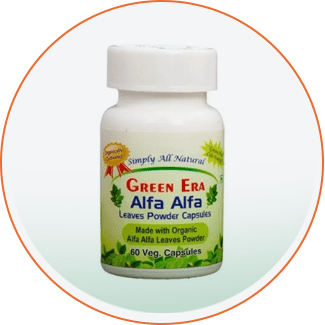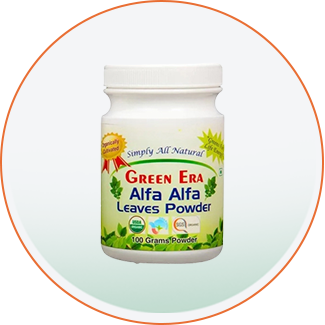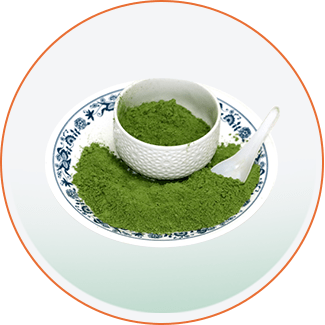Alfa Alfa Leaves products
So what makes this plant so extraordinary? What about it is so powerful and beneficial, not only to the human body, but to agriculture and other animals alike? To begin, the alfalfa plant is just that, a plant. When something is naturally derived and an evolved product of the Earth, the benefits that arise from using it are abundant. The alfalfa plant is naturally high in many essential vitamins, including A, D, E, K, and even the full family of B vitamins. Each individual vitamin has an abundance of health benefits in itself, making them crucial to overall human health. It is surprising for so many different types of vitamins to be present in just one plant, which makes the lure of consuming this plant all the more greater.
Not only does the alfalfa plant contain a full spectrum of important vitamins, but it is also loaded with extremely important minerals such as biotin, calcium, folic acid, iron, magnesium, potassium, and many others. As if there needed to be another reason as to why it’s so great, the alfalfa plant is also super high in protein, especially when dried.
The alfalfa plant, along with many other ancient herbs, has a list of health benefits that are nearly endless. In past experiences, it has been found that regularly ingesting alfalfa can aid in flushing the bowels of built up toxins. In addition, the alfalfa herb has been used widely for diuretic purposes. This is especially common among people who had been experiencing things like heavy water retention or urinary tract infections. Using a natural herb as a laxative or diuretic is much more beneficial than using an over the counter remedy, because there aren’t any added man made chemicals or compounds that could further irritate the situation.
The alfalfa herb is believed to have a direct connection to lowering cholesterol, which is once again in direct connection with all of the positive vitamins and minerals it contains. The alfalfa herb is very good at detoxifying and better purifying the blood. As a result, regular consumption of alfalfa can lower blood pressure and balance hormones. The alfalfa plant has beneficial healing properties against bad breath, sore or achy joints, imbalanced skin conditions, and it even increases immune system functionality. When consumed regularly, it acts as an alternative to over the counter pain medicines for headaches or migraines because of its high calcium and magnesium levels. As anyone can see, consuming alfalfa herb on a routine basis has an abundance of positive health results.
Traditional/Ethnobotanical uses
The medicinal uses of alfalfa stem from anecdotal reports that the leaves cause diuresis and are useful in the treatment of kidney, bladder, and prostate disorders. Leaf preparations have been touted for their anti-arthritic and antidiabetic activity, for treatment of dyspepsia, and as an anti-asthmatic. Alfalfa extracts are used in baked goods, beverages, and prepared foods, and the plant serves as a commercial source of chlorophyll and carotene.
Cholesterol reduction
Alfalfa plant saponins and fiber bind significant quantities of cholesterol in laboratory tests; sprout saponins interact to a lesser degree. Results from one small human study showed that the plant might reduce cholesterol levels.
Other uses
There is no evidence supporting the use of various parts of the alfalfa plant for diuretic, anti-inflammatory, antidiabetic, or anti-ulcer purposes.
What is the recommended dosage?
Alfalfa seeds are used commonly as a supplement to lower cholesterol at doses of 0.75 to 3g/day. However, clinical trials have not been performed to validate this dosage.
How safe is it?
Contraindications
The FDA issued an advisory indicating that children, the elderly, and people with compromised immune systems should avoid eating alfalfa sprouts because of frequent bacterial contamination.
Pregnancy/nursing
Documented adverse effects. May cause uterine stimulation. Avoid use.
Interactions
The vitamin K found in alfalfa can affect the anticoagulant effect of warfarin, resulting in decreased anticoagulant activity and lowered prothrombin time. Based on the potential immunostimulating effect of alfalfa, it has been theorized that alfalfa may interfere with the immunosuppressive action of corticosteroids (eg, prednisone) or cyclosporine.
Side Effects
Alfalfa ingestion, especially of the seeds, has been associated with various deleterious effects. Alfalfa seeds and fresh sprouts can be contaminated with bacteria such as S. enterica and E. coli. The FDA issued an advisory indicating that children, the elderly, and people with compromised immune systems should avoid eating alfalfa sprouts. In general, ingestion of dried alfalfa preparations does not cause serious side effects in healthy adults.
Toxicities
Alfalfa tablets have been associated with the reactivation of systemic lupus erythematosus in at least 2 patients. Changes in intestinal cellular structure were noted in rats fed alfalfa.
References
Alfalfa. Review of Natural Products. factsandcomparisons4.0 [online]. 2005. Available from Wolters Kluwer Health, Inc. Accessed April 16, 2007.
The Alfalfa plant raises minerals deep in the earth that aren’t accessible at first glance since it sends its roots deep down into the dirt (20-30 ft). Alfalfa is rich in nutrients, minerals and vitamins that play big roles in the health, development, and strength of our bones. It has vitamin A, vitamin B1, vitamin B6, vitamin C, vitamin E, vitamin K, and protein. Calcium is also contained by it, not to mention potassium, carotene, iron, and zinc. It is most commonly consumed as seeds, leaves tea, or tablets.
The health benefits of alfalfa are substantial and cover a variety of problems and ailments. In Traditional Chinese Medicine doctors employed this herb and its leaves in treating a multitude of problems of the digestive tract and the kidneys.
Nutritive and Ayurvedic doctors in ancient India frequently utilized the herb to aid digestion. As a poultice for wounds and boils they utilized the plant’s seeds and applied it topically. Additionally, it was used to treat edema and arthritis.
Heart Disease, Cholesterol, and Strokes
One of the significant health advantages of alfalfa is the critical part it plays as a powerful control of cholesterol. The chemicals and fibers in alfalfa appear to stick to cholesterol, preventing it from staying in the blood or on the arterial walls.
The ingestion of alfalfa often helps to rid your body of bad cholesterol, but HDL (high-density lipoprotein) is apparently unaffected by the results of alfalfa.
Therefore, it is supposed that alfalfa helps to prevent the development of plaque on the arterial walls. As a result of this it can help in preventing strokes, heart disease, and in reducing high levels of blood cholesterol.
Cancer
The medical benefits of alfalfa are thought to extend to cancer, also. Cancer studies have observed a connection between alfalfa consumption and prevalence of cancer. It’s documented that alfalfa can help in binding carcinogens within the colon, and works well in their quick removal.
People on Anti-Cholesterol Medications, Steroids, Antibiotics, and Anti-Seizure Meds
In addition to the above, people on a regimen of antibiotics would gain considerably from alfalfa consumption. This is due to the fact that it restores the amounts of vitamin K in your body. Vitamin K often becomes depleted when making use of these antibiotics.
It’s also known to help people who are on anti-cholesterol medication, seizure medication, and steroids. All these decrease the amount of vitamin K in your physique, and alfalfa helps to develop reserves of the vitamin.
Respiratory and Asthma Conditions
Folk remedies handed down the ages imply that alfalfa seeds were utilized to battle breathing conditions like asthma and more.
Diuretic Properties
Some chemical components of alfalfa are proven to possess diuretic properties that assist with the efficient elimination of water in the body. Therefore, alfalfa is believed to be a treatment for edema (the accumulation of excessive water in your body).
Alfalfa Side Effects
As with all natural products, temperance may be the key to preventing side effects. For instance, excessive ingestion of alfalfa may trigger the dislocation of red blood cells, which is very severe.
Studies have found diets that are high in canavanine can actually worsen the disease known as lupus, and canavanine is an amino acid found in alfalfa. However, canavanine is generally not found in the mature leaves of the plant (it’s typically only found in the sprouts and seeds). Thus, any capsules and alfalfa tea produced from leaves that are mature are not likely to contain canavanine. Nonetheless, it is still strongly recommended that all individuals who have lupus or who are going through pregnancy stay clear of alfalfa due to the possible canavanine and saponins content.





